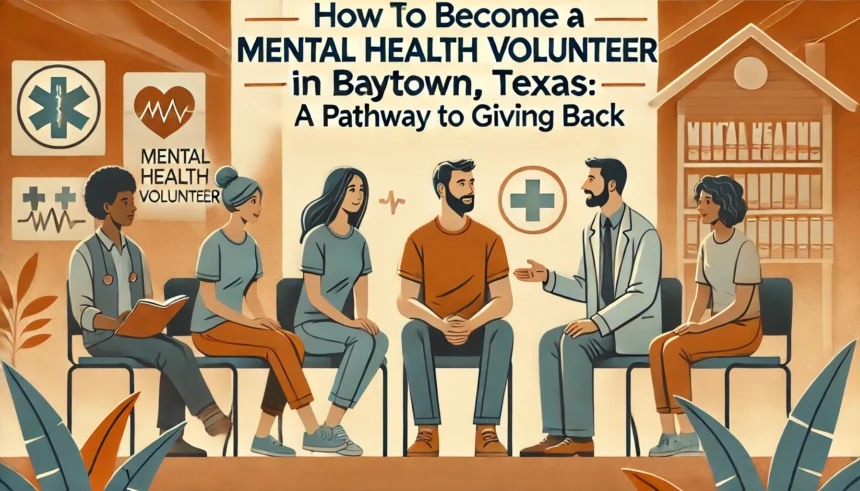Mental health is a critical aspect of overall well-being, yet it often goes overlooked or stigmatized in many communities. In Baytown, Texas, the need for mental health support is growing, and volunteering in this field is a meaningful way to give back to your community. Whether you’re passionate about mental health advocacy, have personal experience with mental health challenges, or simply want to make a difference, becoming a mental health volunteer can be a rewarding and impactful journey.
Why Volunteer in Mental Health?

Before diving into the “how,” it’s important to understand the “why.” Mental health volunteering is more than just a way to fill your time—it’s an opportunity to create a positive impact on individuals and the community as a whole. Here are a few reasons why volunteering in mental health is so important:
- Addressing a Growing Need: Mental health issues, such as anxiety, depression, and trauma, are on the rise. Volunteering helps bridge the gap between the demand for services and the availability of resources.
- Reducing Stigma: By volunteering, you help normalize conversations about mental health and reduce the stigma associated with seeking help.
- Personal Growth: Volunteering can enhance your empathy, communication skills, and understanding of mental health issues.
- Community Building: Mental health volunteers play a key role in fostering a supportive and inclusive community.
Steps :
1. Identify Your Interests and Skills
- Reflect on why you want to volunteer in mental health. Are you drawn to advocacy, direct support, or education? Do you have specific skills, such as counseling, event planning, or public speaking, that could be useful?
- Consider whether you want to work directly with individuals or contribute behind the scenes.
2. Research Local Organizations
- Baytown has several organizations and nonprofits that focus on mental health. Some notable ones include:
- Baytown Mental Health Alliance: A local group dedicated to raising awareness and providing resources for mental health.
- Crisis Intervention of Houston: Offers crisis support and mental health services in the Baytown area.
- Local Hospitals and Clinics: Many healthcare facilities have volunteer programs that include mental health support.
- Reach out to these organizations to learn about their volunteer opportunities and requirements.
3. Complete Necessary Training
- Many mental health volunteer roles require specific training to ensure you’re equipped to handle sensitive situations. Training may include:
- Crisis intervention techniques
- Active listening and communication skills
- Mental health first aid
- Understanding local mental health resources
- Some organizations provide training for free, while others may require you to complete external courses.
4. Apply and Get Involved
- Once you’ve identified an organization and completed any required training, submit your volunteer application. Be prepared for an interview or background check, as many organizations prioritize the safety and well-being of their clients.
- Start with smaller roles to gain experience and gradually take on more responsibilities as you become comfortable.
5. Stay Committed and Reflective
- Volunteering in mental health can be emotionally challenging, so it’s important to practice self-care and set boundaries.
- Regularly reflect on your experiences and seek support from the organization or fellow volunteers if needed.
Ways to Contribute as a Mental Health Volunteer
There are many ways to get involved in mental health volunteering, depending on your interests and skills. Here are some common roles:
- Peer Support Specialist: Use your lived experience with mental health challenges to support others going through similar struggles.
- Helpline Volunteer: Provide a listening ear and resources to individuals in crisis through phone or text-based helplines.
- Community Educator: Help raise awareness about mental health by organizing workshops, seminars, or school programs.
- Event Volunteer: Assist with fundraising events, walks, or mental health awareness campaigns.
- Administrative Support: Help with tasks like data entry, social media management, or coordinating volunteer schedules.
FAQs About Becoming a Mental Health Volunteer in Baytown, Texas
1. Do I need a background in mental health to volunteer?
- Not necessarily. While some roles may require specific qualifications or experience, many organizations provide training for volunteers. A passion for mental health and a willingness to learn are often the most important qualities.
2. How much time do I need to spend?
- The time commitment varies depending on the organization and role. Some opportunities require just a few hours a week, while others may involve more extensive involvement. Be clear about your availability when applying.
3. Is volunteering in mental health emotionally challenging?
- Yes, it can be. Supporting individuals with mental health challenges may involve hearing difficult stories or dealing with crisis situations. It’s important to practice self-care and seek support when needed.
4. Can I volunteer if I have my own mental health challenges?
- Absolutely. Many organizations value the unique perspective of individuals with lived experience. However, it’s important to ensure you’re in a stable place mentally before taking on a volunteer role.
5. Are there age restrictions for mental health volunteers?
- Some organizations may have age requirements, particularly for roles involving direct client interaction. However, there are often opportunities for younger volunteers, such as assisting with events or administrative tasks.
6. How can I find mental health volunteer opportunities in Baytown?
- Start by researching local organizations online, attending community events, or contacting Baytown’s volunteer centers. Networking with current volunteers can also provide valuable insights.
7. Will I receive training?
- Most reputable organizations provide training to ensure volunteers are prepared for their roles. This may include mental health first aid, crisis intervention, and communication skills.
8. Can volunteering lead to a career in mental health?
- Yes! Volunteering is a great way to gain experience, build connections, and explore potential career paths in mental health.


